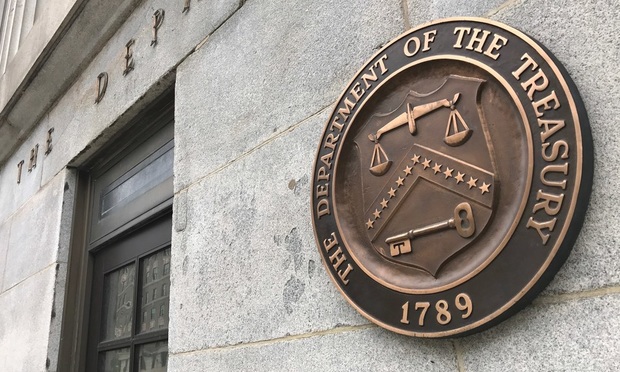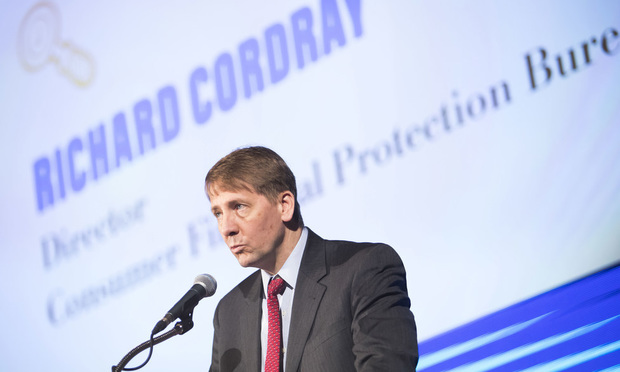Trump's Treasury Department Hits Plaintiffs Lawyers Over CFPB's Arbitration Rule
The Trump administration on Monday took a new chance to bash the Consumer Financial Protection Bureau's push to restrict arbitration agreements, saying the regulation will only put money in the pockets of plaintiffs lawyers.
October 23, 2017 at 02:19 PM
6 minute read

The Trump administration on Monday took a new chance to bash the Consumer Financial Protection Bureau's push to restrict arbitration agreements, saying the regulation—already facing challenges in court and on Capitol Hill—will only put money in the pockets of plaintiffs lawyers.
A U.S. Treasury Department report, published Monday, brought an additional voice into the effort to undercut the rule, which Republican lawmakers and the President Donald Trump-appointed temporary head of the U.S. Office of the Comptroller of the Currency have criticized for the costs it would force the financial industry to bear. Those critics, drawing from the CFPB's arbitration study, have also argued that class actions bring meager relief to aggrieved consumers while arbitration provides a low-cost, efficient alternative to resolve disputes.
“The rule will effect a large wealth transfer to plaintiffs' attorneys,” the Treasury Department report said. “On average, plaintiff-side attorneys' fees account for approximately 31 percent of the payments that plaintiffs receive from class action settlements—and in many types of cases, much more. In an average case, plaintiffs' attorneys collect more than $1 million; actual plaintiffs receive $32 each. The bureau's data indicate that the rule will transfer an additional $330 million over five years from affected businesses to the plaintiffs' bar.”
Against an onslaught of attacks, CFPB Director Richard Cordray has repeatedly defended the arbitration rule—a regulation that is sure to go down as the most sweeping and significant of his tenure leading the Obama-era watchdog agency. In August, Cordray took to the op-ed pages of The New York Times to argue that consumers should have the power to sue banks.
On Monday, CFPB spokesman Sam Gilford said the Treasury Department report “rehashes industry arguments that were analyzed in depth and solidly refuted in the final rule.” Mandatory arbitration clauses, he said, cost consumers billions of dollars by blocking group lawsuits.
“Banks, credit unions and other companies file class action lawsuits to pursue justice when they are harmed as a group, and our rule restores consumers' right to do the same. The Equifax and Wells Fargo cases show how important it is for consumers to be able to band together to take legal action together,” Gilford said. “This report and similar industry analyses fail to make the case for allowing companies to continue using these clauses to deny consumers their day in court.”
Since the summer, Cordray and Keith Noreika, the Trump-appointed acting U.S. Comptroller of Currency, have engaged in a war of words over the rule, which, rather than banning arbitration clauses altogether, prohibits those agreements from forcing consumers to waive their right to file class action lawsuits. Critics of the rule have said it would effectively do away with arbitration agreements, because companies would not subsidize arbitration programs if they still faced the risk of a class action.
Most recently, Cordray wrote a guest column in The Hill, just days after the news outlet published a piece by Noreika that urged the U.S. Senate to undo the arbitration rule through the Congressional Review Act. While the Senate considers vacating the rule, the CFPB is defending the regulation in Texas federal court against a challenge brought by a coalition of financial industry groups and the U.S. Chamber of Commerce, which are represented by a team from Mayer Brown.

The arbitration rules will apply to any new contracts entered into on or after March 19, a date that falls 180 days after the regulation formally took effect. Last week, the challengers to the arbitration rule asked for a preliminary injunction to “stop the running of that 180-day period” while the case is pending.
Noreika has raised concerns that the arbitration rule would jeopardize the “safety and soundness” of the financial system, although he declined to push for the Financial Stability Oversight Council to veto the regulation. Referring to the earlier criticism, Cordray described Noreika's column in The Hill as a “second gratuitous attempt to undermine the evidence that supports our rule.”
“Both times he has relied on so-called analysis that is simply embarrassing,” Cordray wrote.
“We pointed out the far-fetched nature of those claims at the time,” he added. “The total costs of the arbitration rule are pegged at under $1 billion per year, compared to bank profits of $171 billion last year and an asset base of many trillions of dollars. The acting comptroller ultimately stood down and decided not to challenge the rule before the Financial Stability Oversight Council.”
Read more:
Anthony Alexis, Enforcement Chief at CFPB, Is Leaving the Agency
The CFPB, Often a Winner in Court, Hit a Rough Patch This Summer
Mayer Brown's Andy Pincus, Ex-CFPB Attorney Deepak Gupta Debate Arbitration Rule
The CFPB Is Losing a Trial Court Ally in the US Justice Department
The U.S. Treasury Department report is posted below:
This content has been archived. It is available through our partners, LexisNexis® and Bloomberg Law.
To view this content, please continue to their sites.
Not a Lexis Subscriber?
Subscribe Now
Not a Bloomberg Law Subscriber?
Subscribe Now
NOT FOR REPRINT
© 2025 ALM Global, LLC, All Rights Reserved. Request academic re-use from www.copyright.com. All other uses, submit a request to [email protected]. For more information visit Asset & Logo Licensing.
You Might Like
View All
Am Law 100 Lateral Partner Hiring Rose in 2024: Report


Trending Stories
- 1Uber Files RICO Suit Against Plaintiff-Side Firms Alleging Fraudulent Injury Claims
- 2The Law Firm Disrupted: Scrutinizing the Elephant More Than the Mouse
- 3Inherent Diminished Value Damages Unavailable to 3rd-Party Claimants, Court Says
- 4Pa. Defense Firm Sued by Client Over Ex-Eagles Player's $43.5M Med Mal Win
- 5Losses Mount at Morris Manning, but Departing Ex-Chair Stays Bullish About His Old Firm's Future
Who Got The Work
J. Brugh Lower of Gibbons has entered an appearance for industrial equipment supplier Devco Corporation in a pending trademark infringement lawsuit. The suit, accusing the defendant of selling knock-off Graco products, was filed Dec. 18 in New Jersey District Court by Rivkin Radler on behalf of Graco Inc. and Graco Minnesota. The case, assigned to U.S. District Judge Zahid N. Quraishi, is 3:24-cv-11294, Graco Inc. et al v. Devco Corporation.
Who Got The Work
Rebecca Maller-Stein and Kent A. Yalowitz of Arnold & Porter Kaye Scholer have entered their appearances for Hanaco Venture Capital and its executives, Lior Prosor and David Frankel, in a pending securities lawsuit. The action, filed on Dec. 24 in New York Southern District Court by Zell, Aron & Co. on behalf of Goldeneye Advisors, accuses the defendants of negligently and fraudulently managing the plaintiff's $1 million investment. The case, assigned to U.S. District Judge Vernon S. Broderick, is 1:24-cv-09918, Goldeneye Advisors, LLC v. Hanaco Venture Capital, Ltd. et al.
Who Got The Work
Attorneys from A&O Shearman has stepped in as defense counsel for Toronto-Dominion Bank and other defendants in a pending securities class action. The suit, filed Dec. 11 in New York Southern District Court by Bleichmar Fonti & Auld, accuses the defendants of concealing the bank's 'pervasive' deficiencies in regards to its compliance with the Bank Secrecy Act and the quality of its anti-money laundering controls. The case, assigned to U.S. District Judge Arun Subramanian, is 1:24-cv-09445, Gonzalez v. The Toronto-Dominion Bank et al.
Who Got The Work
Crown Castle International, a Pennsylvania company providing shared communications infrastructure, has turned to Luke D. Wolf of Gordon Rees Scully Mansukhani to fend off a pending breach-of-contract lawsuit. The court action, filed Nov. 25 in Michigan Eastern District Court by Hooper Hathaway PC on behalf of The Town Residences LLC, accuses Crown Castle of failing to transfer approximately $30,000 in utility payments from T-Mobile in breach of a roof-top lease and assignment agreement. The case, assigned to U.S. District Judge Susan K. Declercq, is 2:24-cv-13131, The Town Residences LLC v. T-Mobile US, Inc. et al.
Who Got The Work
Wilfred P. Coronato and Daniel M. Schwartz of McCarter & English have stepped in as defense counsel to Electrolux Home Products Inc. in a pending product liability lawsuit. The court action, filed Nov. 26 in New York Eastern District Court by Poulos Lopiccolo PC and Nagel Rice LLP on behalf of David Stern, alleges that the defendant's refrigerators’ drawers and shelving repeatedly break and fall apart within months after purchase. The case, assigned to U.S. District Judge Joan M. Azrack, is 2:24-cv-08204, Stern v. Electrolux Home Products, Inc.
Featured Firms
Law Offices of Gary Martin Hays & Associates, P.C.
(470) 294-1674
Law Offices of Mark E. Salomone
(857) 444-6468
Smith & Hassler
(713) 739-1250









